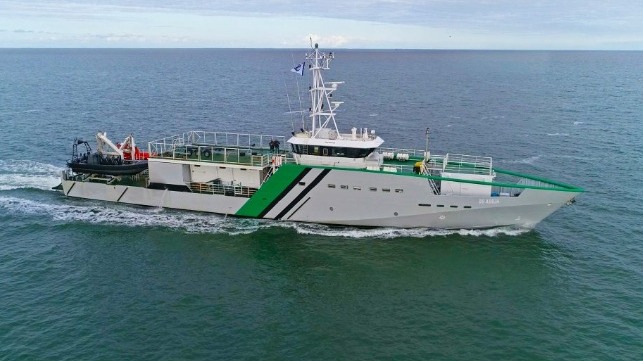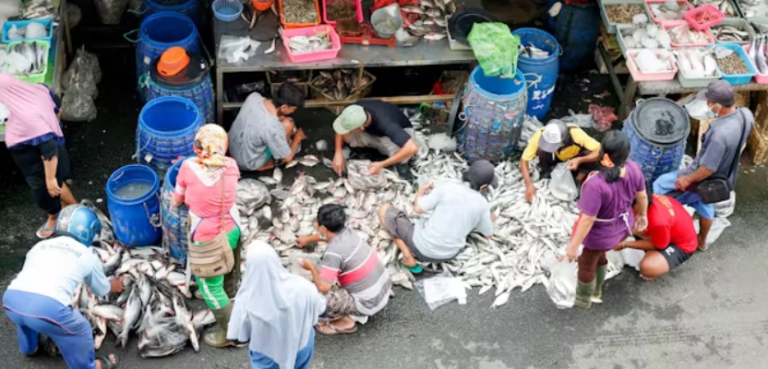Isa Olalekan Elegbede, Brandenburg University of Technology Cottbus-Senftenberg
Nigeria’s President Bola Ahmed Tinubu announced a new ministerial portfolio in August: Marine and Blue Economy. This was welcome news as it renewed hope for economic development outside the oil sector. We asked marine sustainability and blue economy expert Isa Olalekan Elegbede to explain how the ministry could benefit Nigeria.
Why has Nigeria established a new ministry for the blue economy?
The blue economy is the sustainable use of ocean and coastal resources for economic growth. It integrates environmental, social, economic and institutional objectives into the use of marine resources. It includes a wide range of sectors and resources related to oceans, seas, coasts and waterways.
The ocean economy supports 90% of global trade and provides millions of jobs. It includes shipping, tourism and offshore energy valued at US$24 trillion.
Marine fisheries and reefs, sea grass and mangroves are worth US$6.9 trillion; trade and transport US$5.2 trillion; and coastline productivity and carbon absorption US$12.1 trillion.
Nigeria’s establishment of a Ministry of Marine and Blue Economy is a strategic move. I believe the ministry will tap the country’s rich marine resources as an element of the national economic framework.
Nigeria’s coastline stretches for 420 nautical miles and covers an exclusive economic zone of 200 nautical miles. Its maritime interests span the Gulf of Guinea, covering roughly 574,800 square nautical miles with a 2,874 nautical mile coastline.
Marine resources can be exploited to create jobs and transform Nigeria into a leader in sustainable marine activities. It will help diversify the country’s oil-based economy as well. Norway is an example of how this has been done successfully.
What four areas should the ministry focus on?
Nigeria hopes to generate over US$1.5 trillion annually from exploiting its marine resources. To achieve this, the ministry should do the following:
- Create an inclusive committee for effective collaboration among stakeholders and partners. The committee should include scientists, NGOs, youth and traditional communities. Indigenous peoples, persons with disabilities, and the relevant federal government agencies should not be left out. The committee should advance beyond the scope of the Expanded Committee on Sustainable Blue Economy in Nigeria inaugurated by the former president Muhammadu Buhari.
- Integrate sustainability into policies and strategies. Policies should prioritize sustainable marine resource use. Strategies should focus on sustainable and ethical harvesting, trading, extraction and tourism. Blue economy personnel, unemployed youths and women should be trained. Improved programmes would foster sustainable practices and raise the sector’s contribution to the country’s gross domestic product.
- Sustain investment in ports, transport systems and storage facilities. The same should apply to research and technology. Aquaculture, offshore energy and marine biotechnology should be advanced to increase efficiency and sustainability. Additionally, remote coastal communities should have access to resilient and blue renewable energy sources and systems to enhance protection of coastal and ocean resources.
- Check mismanagement. To ensure a sustainable future for all, the government should protect coastal and marine ecosystems. Mismanagement could destabilize the delicate balance of these ecosystems. This is crucial, considering the intricate relationship between the blue economy and marine habitats. Neglect puts fish resources at risk and endangers vital sectors like maritime transport, energy and fishing. Cooperation and commitment to stewardship are therefore imperative to maintaining the health and productivity of the oceans.
What benefits will Nigerians feel if these steps are taken?
Oil is a key revenue source for the country. But it has led to major environmental problems. Harnessing the blue economy could be a game changer for Nigeria.
First, it could create jobs and generate income from fisheries, aquaculture, tourism, shipping and renewable energy.
Second, a blue economy could mitigate environmental damage as it enables the restoration of marine ecosystems. Unlike oil, fisheries are renewable. Nigeria’s oil-rich Niger Delta has experienced severe environmental harm. A shift to greener energy supplies could make a massive difference.
Third, it creates the opportunity to grow the tourism sector. Seychelles and Mauritius are examples of countries that earn foreign exchange from marine exports and tourism.
Fourth, it could help attract investment to Nigeria’s marine infrastructure, fisheries and technology.
Fifth, it could help decrease regional and social inequalities in coastal communities.
Finally, investment in the blue economy could encourage marine biology, oceanography and marine technology research. This could, in turn, lead to global innovations.
Despite competition from more experienced countries in the marine industry, the blue economy offers Nigeria significant potential. Strategic planning, global partnerships and investment can make it a reality.
This article is republished from The Conversation under a Creative Commons license. Read the original article.
Author
-

Lecturer, Brandenburg University of Technology Cottbus-Senftenberg



